West Bengal
Why Dilip Ghosh’s Political Career Went Off Rails
Jaideep Mazumdar
Jun 06, 2025, 12:47 PM | Updated Jul 01, 2025, 09:18 AM IST
Save & read from anywhere!
Bookmark stories for easy access on any device or the Swarajya app.
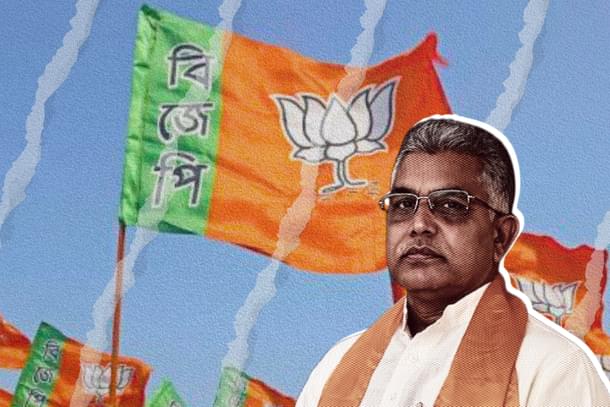
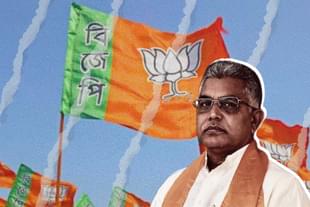
On June 1, Bengal celebrated as Jamai Shosti, a day when sons-in-law are treated to multi-course meals and showered with gifts by their in-laws.
Like countless other married Bengali men, the 61-year-old former Bengal BJP president Dilip Ghosh, who tied the knot with BJP’s Mahila Morcha activist Rinku Majumdar on April 18 this year, also went to his uncle-in-law’s place at Mukundapur in east Kolkata, his wife and mother in tow.
Nothing wrong with that, save for the fact that while Ghosh was relishing the multi-course meal laid out before him that afternoon, Union Home Minister Amit Shah was addressing an important meeting of BJP workers and leaders at the Netaji Indoor Stadium in downtown Kolkata, about 16 kilometres northwest of Mukundapur.
For a former state president of the party who was also a Lok Sabha MP and the national vice-president of the saffron party to remain absent from such an important meeting is highly unusual. Especially, since he had also skipped Prime Minister Narendra Modi’s rally at Alipurduar in North Bengal on May 29.
But then, nothing is quite the usual with the feisty Dilip Ghosh, who has courted controversies and attracted bouquets and brickbats in equal measure ever since the Rashtriya Swamsevak Sangh (RSS) pracharak was ‘loaned’ to the BJP in 2014.
Unlike other RSS members who like to keep a low profile and work silently, Ghosh has always been outspoken and even intemperate. A man with a quick temper and an acerbic tongue, Ghosh has a strong streak of defiance in him.
Niceties and self-restraint are quite alien to him, and he has been known to have disregarded good advice even from RSS old-timers who once mentored him.

Early life and years in the RSS
Ghosh, born in a farmer’s family at Kuliana village in Paschim Medinipur district of Bengal, was the second of four sons. He joined the RSS as a swayamsevak at the age of 19 in 1983 and became a full-timer in the organisation.
His dedication, grit, diligence, and honesty caught the attention of the district RSS leadership, and within a year, he was made a gatanayak or group leader.
“He was very conscientious and sincere, and struck us as a morally upright young man. He would always speak his mind regardless of the consequences and that was considered to be a sterling quality in a young man,” Biswanath Ghosh, 82, a former RSS pracharak who is now settled in Bardhaman, told Swarajya.
“Dilip Ghosh had an easy way of interacting with everyone, especially the common people. He never shied away from hard tasks and was very fearless too,” the octogenarian added.
Another RSS old-timer, Manabendra Adhikary, who knew Dilip Ghosh since the time he joined the RSS, told Swarajya: “It was very difficult and even hazardous at that time to be a member of the RSS and work actively for the organisation. The CPI(M) was in power and the Marxists were viscerally opposed to us and used to consider us their prime enemies. Most of us used to work silently without attracting any attention. But Dilip was different. He was never afraid of declaring himself an RSS man and used to work openly and fearlessly”.
This bull-headedness and fearlessness were his greatest strengths during his younger days. But this strong, stubborn streak has become the source of all the troubles he is facing within the party at present.
Young Dilip Ghosh’s activities as an RSS activist, especially when he was made the karyavah (executive head) of the local sakai, brought him to the ruling CPI(M)’s attention.
“The CPI(M) was very strong in Medinipur and was also very ruthless while dealing with opponents. The CPI(M) could not tolerate a young man like Dilip challenging it and working so openly and defiantly for an organisation (RSS) that the CPI(M) used to consider a pariah. So Dilip, who was promoted as mukhya-shikshak (head teacher and chief of the local shakha), found himself in the cross-hairs of the CPI(M),” said Manabendra Adhikary.
By 1993, Dilip Ghosh became a pracharak. “He was well-liked by the seniors and also the juniors. And he also became popular among the local people who considered him to be one of their own due to his down-to-earth, unpretentious, straight-talking and virtuous ways. He gained quite a reputation for his bluntness and honesty... we knew that he was destined to reach great heights. But many of us used to counsel him to be more diplomatic and restrained, and also desist from criticising others sharply,” Prashanta Giri, an RSS old-timer of Medinipur who is now based in Kolkata, told Swarajya.
By the late 1990s, state RSS leaders learnt that the CPI(M) was planning to target Dilip Ghosh. “We felt his life was in danger. Local CPI(M) leaders in Medinipur were keeping a watch on him and there was the imminent danger of those leaders letting their cadres loose on Dilip Ghosh. We realised something had to be done and we took up this issue with senior vicharaks and also a sah-sarkaryavah (joint general secretary) in Kolkata and Nagpur,” recalled Giri, 73.
In early 1997, the RSS decided that it was too dangerous for Dilip Ghosh to continue living in CPI(M)-ruled Bengal. He had been receiving threats from the CPI(M), whose functionaries had even warned his siblings and relatives that his life would be in danger if he did not dissociate himself from the RSS.
Dilip Ghosh was appointed the prant pracharak of the RSS in the Andaman & Nicobar archipelago, which has a large Bengali population (about 30%) in 1999. He worked hard for the organisation and endeared himself to the top leadership of the organisation.
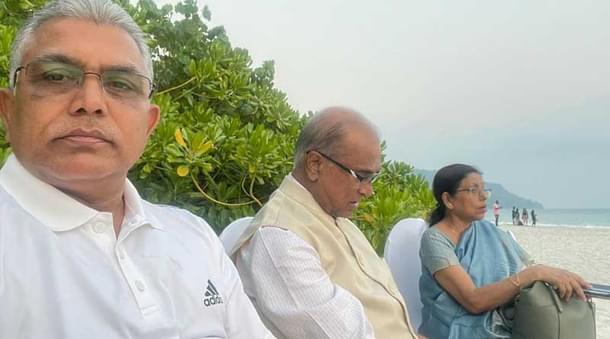
Return to Bengal & debut in politics
Ghosh remained in Andaman & Nicobar for 15 long years. After the BJP, led by Narendra Modi, came to power at the centre in 2014, the party decided to focus on Bengal and make a serious bid for power in the state.
“But the state leadership was considered to be ineffective. Rahul Sinha, the state party president at that time, was uncharismatic and not considered to be a strong leader who could inspire party cadres. So the party started scouting for a replacement for Sinha. Dilip Ghosh’s name cropped up and our central leadership decided he would be the best fit. The RSS was requested to loan him and Ghosh was appointed the general secretary of the state (Bengal) unit in 2014,” a senior BJP functionary who did not want to be named told Swarajya.
Ghosh learnt the ropes within the BJP and within a year, replaced Sinha. “He was a doer. Right from day one, he hit the ground running. He focused on strengthening the party organisation at the grassroots level. He recruited dedicated people into the organisation and within a year’s time, the party had units in most of the villages of Bengal,” said the BJP leader.
Dilip Ghosh proved to be a highly efficient and capable leader who would not brook any slack or waywardness. He also became popular among the masses, especially in the rural areas, because of his earthy disposition and straightforwardness.
“Dilip Ghosh toured Bengal extensively and took a lot of initiatives in strengthening the party organisation. He concentrated on motivating party workers and inspiring them to take on the powerful Trinamool Congress. He advocated an aggressive approach towards the ruling Trinamool Congress, and especially against Mamata Banerjee. The party's central leadership encouraged him to launch a full-scale offensive against the Trinamool. Dilip Ghosh very effectively capitalised on the many scams tumbling out of the Trinamool’s cupboard and mobilised public opinion against the ruling party,” said a former general secretary of the state party unit.
The BJP opened its account in the Bengal Legislative Assembly for the first time in 2016 by winning three seats. The party’s vote share was 10.16%, a creditable increase of more than six percent from 2011. Ghosh was one of three who won; he trumped six-time Congress MLA Gyan Singh Sohanpal from the Kharagpur Sadar seat in his home Paschim Medinipur district.
“The 2016 results were significant because they marked the sprouting of the lotus in Bengal. Dilip Ghosh went all over the state and addressed party workers, telling them that they should celebrate the BJP opening its account in the Assembly. He was instrumental in inspiring the party workers to work harder to ensure a resounding victory in 2021. Dilip Ghosh’s unwavering focus remained on strengthening the party organisation at the grassroots level, motivating party cadres to fight the Trinamool boldly and not get cowed down by threats and attacks from Trinamool cadres,” said the former party general secretary.
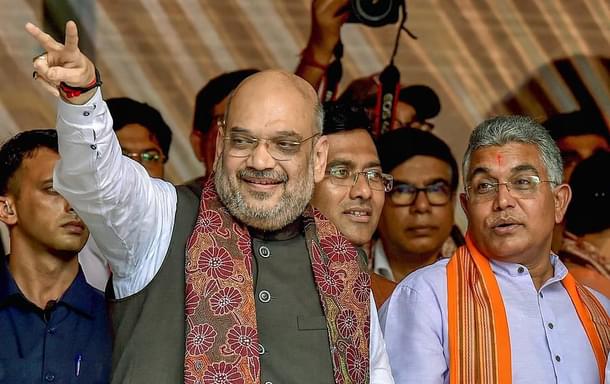
In the runup to the 2019 Lok Sabha elections, the BJP under Dilip Ghosh ran a tight campaign in close coordination with the party’s central leadership as well as the RSS. Ghosh, who always had his ear to the ground, ran an effective campaign and provided many valuable inputs to the central leadership.
The result: BJP’s best-ever performance (till now) with a tally of 18 out of the 42 Lok Sabha seats in Bengal. The party’s vote share stood at 40.7%, an increase of 22.76% from 2014 when it had won only two seats. The vote share of the Trinamool Congress, which won 22 seats (down from 34 in 2014), was just 2.6% more than the BJP’s.
What’s more, the BJP emerged as the principal opposition party in the state, relegating the once-powerful CPI(M) and also the Congress to the sidelines in Bengal’s political landscape.
Dilip Ghosh, say BJP insiders, was rightly credited for the party’s good performance at the hustings. Ghosh won the Medinipur Lok Sabha seat by trouncing his Trinamool Congress rival by a margin of nearly 89,000 votes.
Post-2019 phase and his fall
But, say BJP insiders, success went to Dilip Ghosh’s head and he became arrogant. “He was always outspoken, but he became irascible after becoming an MP. He started treating many party old-timers with disdain and openly abused them, calling them ineffective and worse. Many old-timers started distancing themselves from him,” said a BJP functionary from Kharagpur town who had known Ghosh very closely since 2014.
The BJP central leadership, enthused by the party’s performance in Bengal in the 2019 Lok Sabha elections, started planning to win Bengal in 2021.
“The party (BJP) decided to go all-out and make a determined bid to oust the Trinamool from power. The party’s central leadership, perhaps unwisely, decided to micromanage the campaign in Bengal in the run-up to the 2021 Assembly elections. A large number of central party leaders and senior functionaries from other states descended on Bengal. That angered Ghosh, who expected to be given a free hand in steering the 2021 poll campaign,” said the former state general secretary.

The BJP central leadership had, by mid-2020, decided in principle to induct important leaders from the Trinamool Congress into the party. The party had started receiving feelers from many in the Trinamool.
“Party's central leadership felt that the Bengal BJP lacked enough charismatic leaders with mass support. In order to meet this deficit and give the state unit an edge, it was decided to open the doors for lateral entry of important leaders as well as cadres from the Trinamool into the BJP. Ghosh was unhappy with this decision and argued against it, but the party central leadership cited the case of Assam, where leaders like Sarbananda Sonowal and Himanta Biswa Sarma, who were brought in from rival parties, boosted the BJP’s prospects and were instrumental in the BJP coming to power in that state in 2016. Dilip Ghosh’s objections were turned down,” said another BJP leader who had served as the vice-president of the state unit of the party.
One of the first major leaders to be inducted was Suvendu Adhikari in December 2020. His entry into the BJP was followed by that of many other Trinamool Congress MLAs and leaders who were disgruntled for various reasons with their (Trinamool) leadership.
At the same time, leaders deputed from other states or the centre by the BJP central leadership assumed the reins of the party’s Assembly poll campaign. Dilip Ghosh felt sidelined, neglected, and humiliated.
"Dilip da raised objections to the large-scale entry of Trinamool leaders and cadres into the party. He was very unhappy when many of them were given BJP tickets. He told the party’s central leadership that the BJP old-timers would get disillusioned and would not work for the party since the very people (from the Trinamool) who had targeted and tormented them were now being given importance after their induction into the BJP. But Dilipda’s objections were disregarded and he was told to adhere to party discipline," a close associate of Ghosh who had contested and won (on a BJP ticket) from a south Bengal Assembly seat (in 2021) told Swarajya.
The 2021 results dealt a big blow to the BJP’s ambitions of coming to power in Bengal. The party fell far short of its target of winning 200 (of the 294 Assembly) seats and could bag only 77. Its vote share also fell (as compared to the 2019 Lok Sabha polls) to 38.14%.
Immediately after the Assembly results were announced, a victorious but vengeful Trinamool Congress unleashed its cadres on BJP workers and functionaries. Thousands of BJP workers and supporters, as well as their family members, were attacked and driven out of their homes, their properties looted and destroyed. More than 40 BJP workers were also killed, some of them very brutally.
The BJP leadership failed to stand by its beleaguered party workers. While a huge number of defectors from the Trinamool (to the BJP) returned to that party, BJP leaders, especially those from other states, abandoned the party workers in Bengal.
This incensed Dilip Ghosh, who started speaking out openly against the BJP central leadership. "Dilip da’s stand against inducting turncoats from the Trinamool Congress was vindicated when most of them returned to the Trinamool. Dilip da also could not accept the manner in which party workers were left to fend for themselves. He strongly felt that being in power at the centre, the party could do a lot to compel the Bengal government and the Trinamool to stop the attacks on BJP workers,” Ghosh’s associate added.
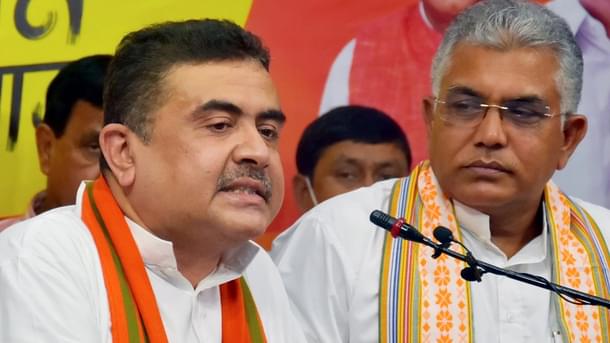
Ghosh also resented the importance that was being accorded to Suvendu Adhikari by the party’s central leadership. He told the party’s central leaders, and also senior RSS leaders, that promoting Adhikari would be a huge mistake. But once again, overriding Ghosh’s objections, Adhikari was made the leader of the opposition.
Then, in September 2021, Ghosh was removed from the post of the party’s state president and Sukanta Majumder was appointed in his place. Though he was appointed as the national vice-president of the party, Ghosh sulked because he knew it was an inconsequential post. There are about a dozen national vice-presidents of the party.
An angry and disgruntled Ghosh kept on speaking out against party leaders and staging various acts of defiance. He became quite vocal and lashed out at state party leaders he disliked.
By that time, Ghosh had also started alienating many BJP old-timers and former associates. “He got surrounded by a coterie of self-serving people who were his sycophants. The more he listened to them, the more he got alienated from his associates and well-wishers,” a BJP functionary of the Paschim Medinipur district unit of the party, who was a close aide of Ghosh, told Swarajya.
His verbal duels with Adhikari, Sukanta Majumder and some other party leaders also increased and Ghosh was often upbraided by the top BJP and RSS leadership for speaking out against his party colleagues and passing disparaging remarks against them.
Ghosh was unceremoniously removed from the post of national vice-president in July 2023. That alienated and angered him more, and after that he became more vocal in his criticism of the party’s central and state leadership.
What also earned him the displeasure of many in the party, as well as the RSS, was the changes Ghosh made to his lifestyle. “Dilip da took a fondness to many luxuries of life. He started living in a big and luxurious villa costing over Rs 1.2 crore. His flashy lifestyle did not go down well with many, especially RSS seniors, who place a premium on simple living and abstinence,” said a senior BJP leader.
Ghosh also became quite unpopular in his own Lok Sabha constituency (Medinipur). “Dilip da had become quite abrasive and alienated many party functionaries and workers with his brusque behaviour. He was also seen as an ineffective MP who did very little for his constituency. Many party office-bearers of the district petitioned the party leadership against giving him the party ticket from Medinipur in 2024,” said a senior functionary of the Paschim Medinipur district unit of the party.
Ghosh was not given any major responsibilities in the campaign for the 2024 Lok Sabha elections. And he shifted from Medinipur to another seat, Bardhaman-Durgapur, on the eve of the deadline for filing nominations. Ghosh lost to the Trinamool’s Kirti Azad by a huge margin of 1.38 lakh votes.
Ghosh blamed his party colleagues for his defeat and started distancing himself from the party. He also started dropping loud hints that he would resign from the BJP.
But the party leadership ignored him and simply refused to give him any importance or credibility. That enraged Dilip Ghosh even more.
His decision to wed a BJP Mahila Morcha functionary, Rinku Majumdar, on April 18 this year was frowned upon by BJP and RSS seniors. RSS pracharaks take a vow of celibacy and he was seen to have broken that sacred vow.

Many in the party and the RSS had, even before his wedding, disapproved of his ties with Rinku Majumdar, a divorcee with a son. Her 26-year-old son, who was working in an IT firm, died just last month.
But what really incensed BJP and RSS leaders was Ghosh’s presence, along with his wife, at the inauguration of a Jagannath temple at Digha, a seaside town in Bengal, by chief minister Mamata Banerjee, on April 30.
Not only did Ghosh and his wife visit the temple on the day of its inauguration, they also met Mamata Banerjee there and spent some time with her. This drew a lot of criticism from many BJP leaders, including state party chief Sukanta Majumdar.
Defending his actions, Ghosh said he saw nothing wrong in visiting a temple and in being civil with Mamata Banerjee. “She is, after all, the chief minister of the state. We may be political rivals, but we have to be civil towards each other. I visited the Jagannath temple and had no plans to meet her there. Mamata Banerjee came to know of my visit and sent a minister to invite me and my wife to meet her. I could not refuse, so I met her and we chatted for some time,” he said.

But there are no takers for this explanation. “Dilip Ghosh went to Digha deliberately to cock a snook at us. It was an act of defiance on his part,” said a top BJP state functionary who did not want to be named.
It, thus, came as no surprise to anyone when Dilip Ghosh did not receive any invitation to attend the Prime Minister’s rally at Alipurduar in North Bengal last week on May 29.
Ghosh, while admitting he was not invited to the PM’s programme, also said that he did not believe in the culture of flocking to meet senior party leaders. He termed it a ‘culture of sycophancy’, which he was against.
His absence from Amit Shah’s meeting with party karyakartas last Sunday (June 1) has confirmed the belief that Ghosh has been completely relegated to the margins by the party leadership.
According to BJP seniors, the party is keeping a close watch on Dilip Ghosh and waiting for him to make his next move. While there is speculation that he may join the Trinamool Congress, his former aides say that Ghosh will try to float a party of his own by roping in some disgruntled BJP functionaries.
Either way, it is a sad fall for a leader who had been credited with steering and helming the BJP’s rise in Bengal. Dilip Ghosh’s supporters maintain he was treated unjustly by the party, and his detractors say that he is responsible for his own downfall.
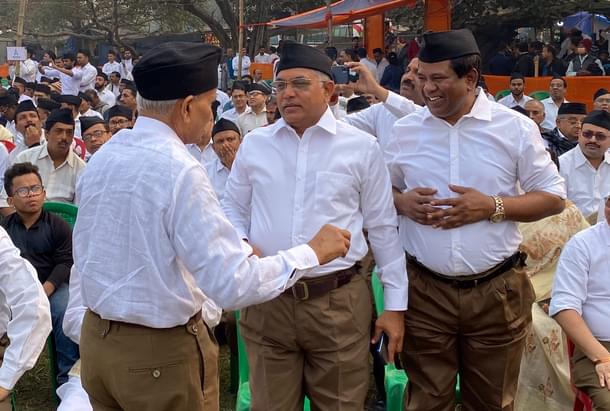
But a few RSS seniors say that Dilip Ghosh should have maintained his cool even when his advice was being disregarded by the BJP central leadership. “He should have kept his head down, remained silent and fulfilled whatever responsibilities the party gave him like a disciplined worker. Instead, he hankered for power, importance, and luxuries. That was completely alien to the RSS philosophy and culture,” said a senior RSS leader.
Dilip Ghosh today, say BJP leaders, is a pale shadow of his former fiery self. Even if he leaves the BJP, his departure will not be mourned by most. They say that Ghosh’s political career is over. But some others aren’t willing to write him off so soon. Wait and watch, they say.





